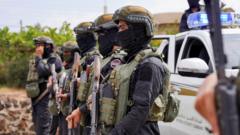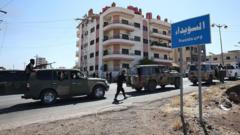The Islamic State (ISIS) has claimed responsibility for a series of bombings that have directly targeted Syrian government forces for the first time since the regime transition that occurred in December 2024. This series of attacks, reported by a prominent war monitoring group, underscores the extremist group's continued activity in the region despite a decade of effort to diminish its presence.
Islamic State Resurgence: New Attacks Target Syrian Forces

Islamic State Resurgence: New Attacks Target Syrian Forces
ISIS has resumed direct assaults against the Syrian government, marking its first attacks since the regime's takeover after Bashar al-Assad's fall.
According to statements released online, ISIS asserted that its operatives planted explosives that successfully struck Syrian military personnel and allied militia members. While the Syrian government has not officially confirmed these attacks, it has conducted raids against alleged ISIS fighters in the Damascus area in the last week, illustrating ongoing tensions in the region.
A report from the Syrian Observatory for Human Rights—a United Kingdom-based monitoring organization—indicated that in one of the attacks, a remote-controlled landmine hit a patrol, resulting in one fatality and injuries to three soldiers from the Syrian Army’s 70th Division. The attack marked a concerning resurgence in ISIS activity within the southern province of Sweida.
This region, predominantly controlled by the Druse minority, has been relatively untouched by ISIS activity for nearly a decade. Nevertheless, government forces have struggled to maintain order, especially following sectarian violence that claimed over a hundred lives during recent clashes between local militants and pro-government factions.
The Islamic State, having lost substantial territorial control in previous years, has attempted to revive its insurgency since the fall of Assad, even orchestrating attacks within the capital, Damascus. Notably, these recent bombings reflect a troubling shift in security dynamics throughout the country, especially as the group takes advantage of the current political turmoil and power vacuums within Syria.
A report from the Syrian Observatory for Human Rights—a United Kingdom-based monitoring organization—indicated that in one of the attacks, a remote-controlled landmine hit a patrol, resulting in one fatality and injuries to three soldiers from the Syrian Army’s 70th Division. The attack marked a concerning resurgence in ISIS activity within the southern province of Sweida.
This region, predominantly controlled by the Druse minority, has been relatively untouched by ISIS activity for nearly a decade. Nevertheless, government forces have struggled to maintain order, especially following sectarian violence that claimed over a hundred lives during recent clashes between local militants and pro-government factions.
The Islamic State, having lost substantial territorial control in previous years, has attempted to revive its insurgency since the fall of Assad, even orchestrating attacks within the capital, Damascus. Notably, these recent bombings reflect a troubling shift in security dynamics throughout the country, especially as the group takes advantage of the current political turmoil and power vacuums within Syria.



















